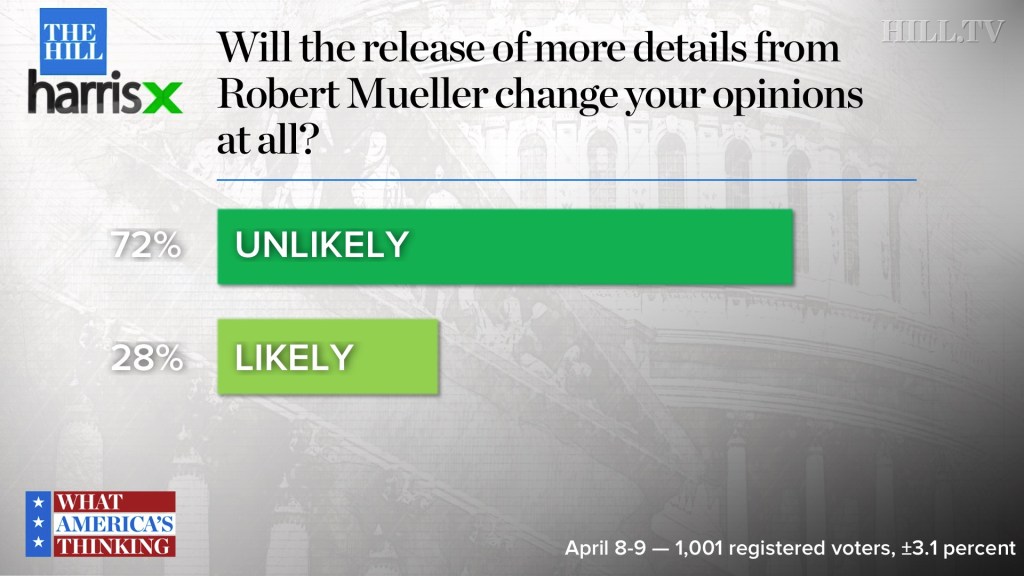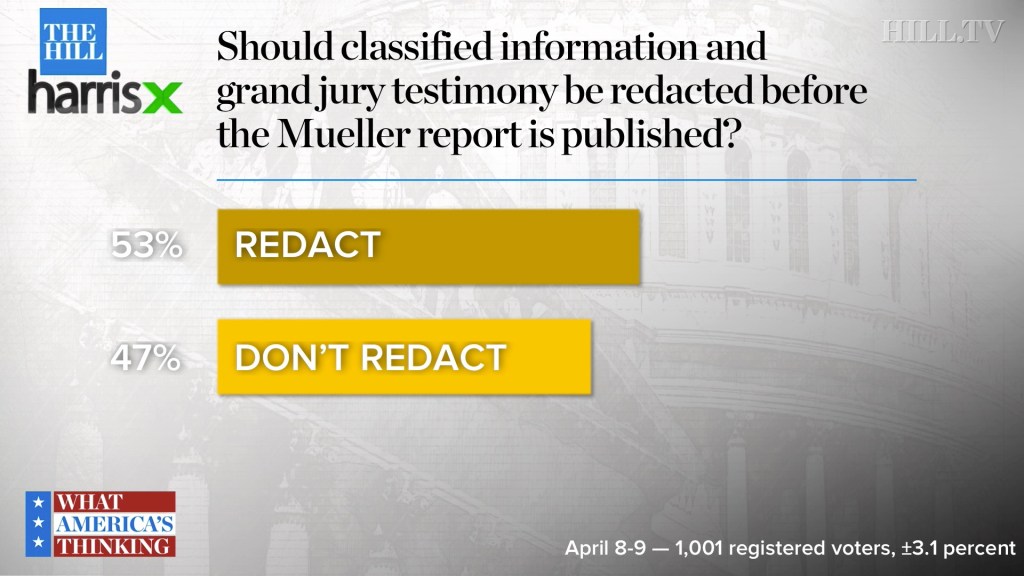The vast majority of Americans say their opinions of special counsel Robert Mueller’s findings are unlikely to change after more information from his investigation is released.
In a Hill-HarrisX survey of registered voters, an overwhelming 72 percent said that more information from Mueller’s probe into Donald Trump’s 2016 presidential campaign and Russian interference in the election would be unlikely to make them re-think their beliefs. Only 28 percent said that their opinions could shift.
The results come amid a bruising battle in Washington over the release of Mueller’s full report.
Attorney General William Barr released a four-page summary of Mueller’s findings in March that said the special counsel did not find evidence of a conspiracy between Russia and Trump’s campaign or organization.
The letter also said Mueller had not made a finding on obstruction of justice against Trump. Barr wrote that he and Deputy Attorney General Rod Rosenstein concluded there was not enough evidence to bring such a charge.
 Democrats have clamored for the release of the full report, with the House Judiciary Committee authorizing the issuance of a subpoena.
Democrats have clamored for the release of the full report, with the House Judiciary Committee authorizing the issuance of a subpoena.
Barr testified Tuesday and Wednesday at separate hearings on Capitol Hill that he intends to release a redacted version of the report to Congress soon.
Democratic respondents in the poll were more likely to say that their viewpoints about the Russia investigation might change once more is released.
However, 61 percent of Democrats doubted their views would be changed.
Eight-five percent of Republicans said their opinions would be unlikely to change as did 73 percent of independents.
There was also widespread agreement that Mueller would have publicly spoken out if he believed that Barr had inaccurately summarized the report. Mueller’s team did speak out earlier this year in response to one news story it said had been incorrect.
Sixty percent of voters said that Mueller would have publicly addressed incorrect statements from Barr while only 40 percent said he would have remained silent.
Most independents, 57 percent, said they believed the special counsel would have disputed inaccurate statements about his work as did 53 percent of Democrats and 70 percent of Republicans.
A report in The New York Times last week said some members of Mueller’s team had told associates that their report was more troublesome for Trump than Barr’s letter indicated. Separately, The Washington Post reported that some on Mueller’s team were frustrated with Barr’s letter and that the evidence on obstruction of justice was significant.
Respondents were more closely divided on when asked about their own opinion of whether Barr had correctly described Mueller’s work. A small majority, 54 percent, said that the attorney general’s congressional letter was “largely accurate” while 46 percent said it was “largely inaccurate.”
Independents sided with Republicans in believing Barr had acted properly. Fifty-nine percent said the attorney general’s description of Mueller’s legal recommendations was largely accurate, as did 75 percent of GOP respondents.
Democrats were skeptical of Barr with 67 percent saying that they believed his conclusion summary was mostly inaccurate and 33 percent saying it was largely accurate.
“The partisan fight over the summary and the release of the Mueller report is in full swing, and the findings reflect that tug of war, showing strong partisan divides. However most voters have faith in the process and the players involved, as do coveted independents,” Dritan Nesho, CEO of HarrisX said.
 Voters were closely divided on whether Barr and Mueller’s offices should remove material gleaned from classified sources or grand jury testimony from the public version of the special counsel’s report.
Voters were closely divided on whether Barr and Mueller’s offices should remove material gleaned from classified sources or grand jury testimony from the public version of the special counsel’s report.
A small majority, 53 percent, said that this information should be redacted from the Mueller paper before it is released publicly while 47 percent said it should not be. The 4-point spread is just outside the survey’s 3.1 percent sampling margin of error.
Seventy-two percent of GOP respondents and 55 percent of independents said the report should have redactions. Sixty-three percent of Democrats said the report should not be redacted.
There was a strong age gap among respondents on this question with younger voters being much more likely to favor unredacted publication and older voters wanting the report to be censored.
Thirty-nine percent of respondents who were 50 and older said the Mueller findings should be redacted before publication compared to 55 percent of voters who were younger than 50.
—Matthew Sheffield
hilltv copyright
